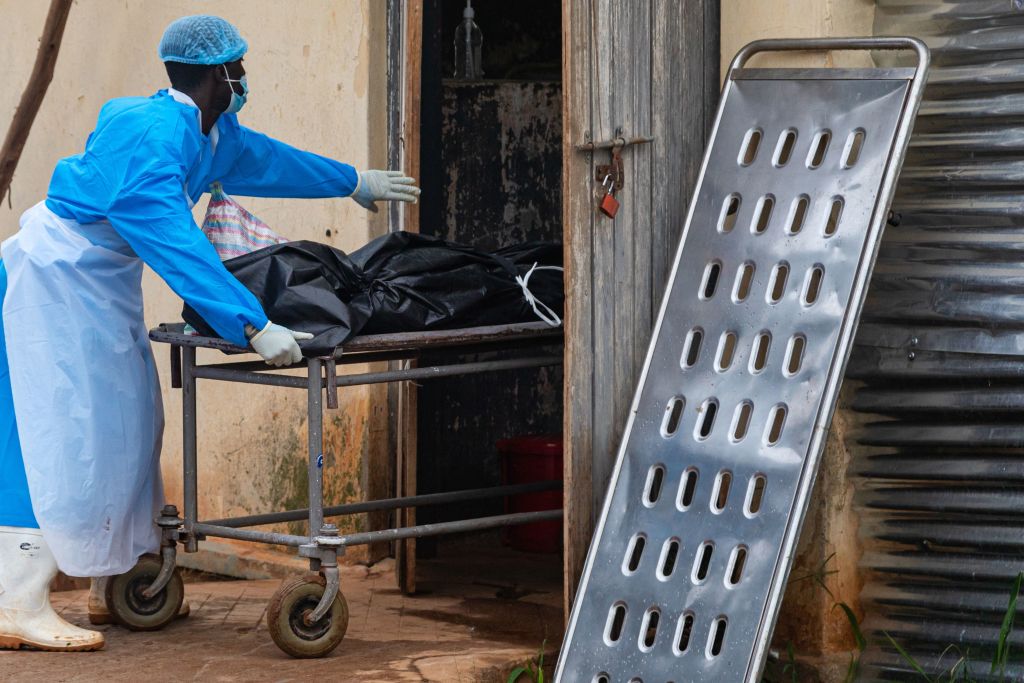Uganda Employs COVID-19 Lessons in Ebola Response
ADF STAFF
Maliko Sempewo’s wife and son are among more than 140 people who have died from Ebola since the virus appeared in Uganda in September.
“They said that we must be under surveillance for at least 21 days,” Sempewo told Deutsche Welle (dw.com) about the remainder of his family. “They often take our temperature.”
As Uganda grapples with the ongoing outbreak of the Ebola virus, the country is building on its experience with COVID-19. Among other things:
- Uganda now produces the protective equipment for health care workers that it once imported.
- The government has repurposed its COVID-19 advisory task force to manage the country’s Ebola response.
- Laboratory capacity that expanded for COVID-19 now makes it possible to get Ebola test results in a matter of hours instead of days or weeks.
“The training of health workers and the mobilization of communities from COVID — that kind of experience has been drawn over to Ebola,” Dr. Emmanuel Paul Batiibwe, director of Mubende Regional Referral Hospital, told dw.com.
Since the outbreak of the Sudan strain first was declared on September 20, Uganda’s Ministry of Health has reported 141 confirmed cases and 55 confirmed Ebola-related deaths — a 40% fatality rate. The country has recorded 79 recoveries.
Unlike the Zaire strain found in West Africa, the Sudan strain has no vaccine. The World Health Organization has approved trials of three possible vaccines during the current outbreak.
The Mubende district, where the outbreak began, accounts for nearly 50% of all cases and remains the most active location for infections. However, the virus has spread across nine provinces, including the capital and several other urban areas.
Since the outbreak began, health officials have used contact tracing to ensure that any potentially infected people quarantine themselves for 21 days to prevent further spread. The government closed schools early and recently extended quarantines of the Mubende and Kassanda districts until mid-December to contain the virus.
Drawing on the experience from its COVID-19 lockdown, the government is letting commercial vehicles enter quarantine zones to avoid disrupting food, medical equipment and other crucial supplies.
Health care workers account for nine of the 55 confirmed Ebola deaths and remain at high risk.
The COVID-19 outbreak prompted the Ugandan government to provide financial incentives for companies to produce masks and other protective equipment at home rather than compete internationally to import them.
Uganda-based Biogenics was among the companies that became a major producer of the same equipment protecting health care workers during the Ebola outbreak. The company makes about 100,000 three-ply surgical masks a day for distribution in Uganda.
COVID-19 lessons have improved the government’s response to the Ebola outbreak, particularly through the connections it forged between the government and its partners in the public and private sectors, Batiibwe said.
“You have seen the response this time of partners and the government is much, much faster,” he told dw.com.
Lab capacity expansion during COVID-19 has hastened the Ebola response. Before the pandemic, the country had just one facility — the Uganda Virus Research Institute (UVRI) — capable of testing samples. The pandemic helped expand that capacity to other health care facilities across the country.
According to UVRI Director Pontiano Kaleebu, it now takes about five hours from the time a sample arrives to determine whether a person is infected with Ebola. The steps needed to confirm infection make the total turnaround time about 12 hours.
Due to COVID-19, health officials can quickly know whether a person is a potential source of Ebola and isolate them.
“It used to take longer — days, weeks — before you intervened. And that was a problem,” Kaleebu told dw.com. “But now we have the labs. You get the results quickly, and you intervene.”


Comments are closed.